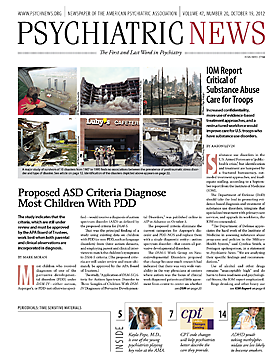Off-label prescription of second-generation antipsychotics (SGAs) to youth aged 3 to 18 in the Medicaid system has increased dramatically in recent years, according to a report in Health Services Research.
Prescription of antipsychotics for this population increased by 62 percent from 2002 to 2007, according to the report, which was published online September 4.
Although youth with bipolar disorder, schizophrenia, or autism proportionally were much more likely to receive antipsychotics at the end of the study period than they were in 2002, those with attention-deficit/hyperactivity disorder (ADHD) and those with three or more diagnosed mental illnesses received the largest number of prescriptions for SGAs over time. By 2007, youth with ADHD accounted for 50 percent of total antipsychotic prescriptions, and 1 in 7 antipsychotic users had ADHD as his or her only diagnosis.
The Food and Drug Administration (FDA) has not approved the use of antipsychotics to treat ADHD or conduct disorders in children.
David Rubin, M.D., and Meredith Matone, M.H.S., and colleagues at Children’s Hospital of Philadelphia used Medicaid Analytic Extract (MAX) files for 50 states and the District of Columbia from 2002 to 2007 to calculate the number and proportion of children within each diagnostic category who were receiving SGAs.
They found that by 2007, the number of Medicaid-enrolled children aged 3 to 18 prescribed SGAs had reached 354,000. This increase was evident across the majority of diagnostic categories.
Children with diagnoses that were clinically indicated for antipsychotic use, such as bipolar disorder and schizophrenia, received these medications at the highest rates proportional to the number with those disorders; however, nearly two-thirds of children prescribed antipsychotics (65 percent) were receiving them for indications not approved by the FDA, such as for ADHD and conduct disorder.
In 2007, 50 percent of all children taking antipsychotics had a diagnosis of ADHD, and 14 percent had ADHD as their only mental health diagnosis, according to the report.
The researchers acknowledged that misclassification of diagnosis—either because of faulty coding by clinicians or because even an accurate code may not reflect the clinical complexity of an individual patient—is a limitation of the study. But the enormous increase in SGA prescriptions suggests a problem that should be of concern to patients and their families, as well as to clinicians and policymakers.
“The growing intensity of SGA use across so many diverse diagnostic categories suggests a malleable environment in which almost any diagnosis might illicit treatment,” the researchers wrote. “Given the disproportionate representation of children with an ADHD diagnosis among SGA users, provider education around the safe and limited use of SGAs in pediatric populations might prove an appropriate component of a multidimensional public health response to this issue.”
APA President-elect Jeffrey Lieberman, M.D., called the data “alarming,” and he wondered whether the prescribing was being done by specialists or primary care physicians. “The fact that antipsychotic medications are being increasingly prescribed for children is one thing,” he said. “But that the most common reason is for non-indicated purposes causes me to wonder who is doing the prescribing and to control what kind of symptoms.”
(In an e-mail to Psychiatric News, Matone said the study did not include collection of provider data.)
Regarding the high rate of prescribing for ADHD, Lieberman said, “My initial inference would be that they are being used for associated disruptive or agitated behavior that can be difficult to control. But the principles reflected in APA treatment guidelines indicate that generally anytime a psychotropic medication is used, there must be a clear rationale, and it must be prescribed for an appropriate purpose. When it comes to children, those principles even more strictly apply, and we must be even more cautious.”
Lieberman added, “Although prescribing medications off-label is a necessary and common practice in medicine, including psychiatry, when this is done in children, the rationale needs to be compelling with great attention to safety considerations.”
He also suggested that public-sector children may be especially susceptible to questionable or inappropriate prescribing. “It’s possible that for children in the public sector, there is less time and less personnel available to provide nonpharmacologic modes of treatment, like psychotherapy or behavioral management, and medications become the expedient form of treatment,” he said.
This study was funded by the Agency for Healthcare Research and Quality and a fellowship to one of the authors from the Stoneleigh Foundation.



